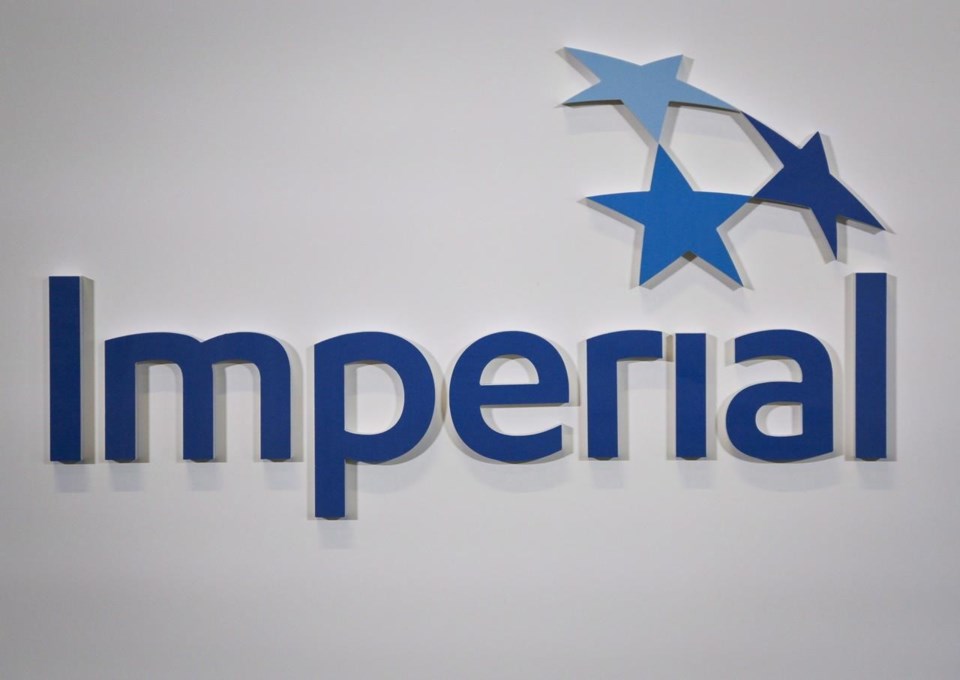CALGARY — Imperial Oil Ltd. is going ahead with a $720-million project to build a renewable diesel facility at its Strathcona refinery near Edmonton.
The project, first announced in August 2021, is expected to produce 20,000 barrels per day of renewable diesel once it is complete.
That will make it the largest facility of its kind in Canada, upon its expected completion in 2025, and one of the largest renewable diesel complexes in North America.
"We would consider ourselves world-class. When you look around the world, there are not many (renewable diesel) plants at 20,000 barrels per day or higher," said Jon Wetmore, Imperial's vice-president for downstream, in an interview Thursday.
Renewable diesel is the term given to a biomass-based fuel that is chemically equivalent to petroleum diesel. This means it can be transported directly in petroleum pipelines or sold at retail stations without any infrastructure modifications or fuel blending.
Renewable diesel can be made from vegetable oil, animal fats, used cooking oil or even algae. In Imperial's case, the Strathcona refinery facility will use locally sourced vegetable oils — such as canola, soybean and sunflower.
Imperial will also be partnering with Pennsylvania-based Air Products — which is building a hydrogen facility near Edmonton — to supply hydrogen via pipeline to the Strathcona refinery. The low-carbon hydrogen will also be used in the production of the renewable diesel.
As a non-fossil fuel-based product, the renewable diesel produced at the Imperial facility is expected to reduce annual greenhouse emissions by about three million tonnes compared to conventional fuels, the company said.
A significant portion of the production from the Strathcona renewable diesel facility will be sent to British Columbia to support the province’s plan to lower carbon emissions, and the company also plans to use renewable diesel in its own operations as part of its emission reduction plans.
The facility's construction will create about 600 direct construction jobs, Imperial said.
"A big day for Alberta, for Canada, and above all for workers with this new step forward from Imperial Oil," federal Natural Resources Minister Jonathan Wilkinson said on Twitter.
"This investment will create and support jobs, lower emissions, and help ensure Canada’s economic prosperity."
The news was also praised by clean energy think-tank the Pembina Institute, which called it a "positive announcement."
Pembina, as well as other environmental organizations, has been critical of the 91原创 oilsands industry over the last year for what the think-tank believes is the industry's failure to move quickly on decarbonization plans during a period of high commodity prices and record profits for oil companies.
Imperial, for example, reported its 2022 third-quarter profit more than doubled compared with a year ago, totalling $2.03 billion — an impressive figure that's been used as ammunition by critics who believe the company, and others like it, can afford to invest more into environmental initiatives.
Imperial is also a member of the Pathways Alliance, a consortium of oil and gas companies that have committed to achieving net-zero greenhouse gas emissions from operations by 2050. Among that group's proposals is a massive carbon capture and storage network in northern Alberta, though a final investment decision for that project has not yet been made.
Jan Gorski, the Pembina Institute's oil and gas program director, said in order to thrive in a net-zero world, 91原创 energy companies need to diversify away from fossil fuels, while at the same time reducing the carbon footprint of their oil and gas production methods.
The renewable diesel announcement, Gorski said, falls into that first category.
"It's a perfect example of that," Gorski said. "But we’re still waiting to see investments in reducing emissions from their existing operations."
Wetmore said from Imperial's perspective, renewable diesel is just one piece within a "layered" emissions reduction challenge.
“Decarbonization is such a diverse set of issues that there is no one item here that is a silver bullet that can be done quickly and easily," he said. "If that was the case, the oil industry would have already moved on to the very, quick urgent projects that we could drive home very quickly.
"(Renewable diesel) can be implemented sooner than things like carbon capture, and some of the technologies that are not quite ready."
This report by The 91原创 Press was first published Jan. 26, 2023.
Companies in this story: (TSX:IMO)
Amanda Stephenson, The 91原创 Press



